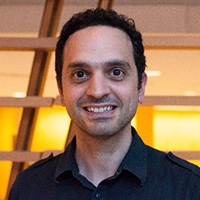
April 2024
Lefteris Michailidis started his research on viruses as an undergraduate student back in Greece working with herpesviruses. He then moved to the U.S. for his PhD studies at the University of Missouri, where Dr. Michailidis studied HIV and mechanisms of action and resistance to antivirals. In 2014, he moved to New York for his postdoctoral fellowship and worked on hepatitis B virus (HBV) and multiple RNA viruses, including flaviviruses and coronaviruses.
In 2021, Dr. Michailidis started his own lab at Emory University in the Division of the Laboratory of Biochemical Pharmacology (LOBP), famously known for antiviral drug discoveries. His research looks at virus-host interactions in the context of hepatitis B virus, HIV and coronaviruses, with a focus on innate immunity. Dr. Michailidis also collaborates with labs in the LOBP division, so they can identify mechanisms for antiviral drugs in host-responses and how cells respond to infections and drug treatment.
Dr. Michailidis and his team have been testing antiviral drugs that target the hepatitis B virus and found several host factors that impact the control of virus replication. The team has been following these cellular factors and pathways to understand virus biology and identify novel antiviral strategies. Dr. Michailidis also collaborates outside of Emory with teams that employ proteomics and genetics tools but also beyond viruses he collaborates on fatty liver disease projects. These studies have already revealed genes and proteins that impact viral replication and the Michailidis lab is current investigating the molecular mechanisms of these phenotypes.
The Research process involves thinking about gaps in knowledge in this area – what is known and what is needed? It’s also important to see what collaborations the team may need to go one step further than what their lab can do. Data can also help form the next steps. Dr. Michailidis says, “our job in basic science is so interesting because you can identify and discover things no one else has ever discovered and if these findings help people’s health, then this is the most fulfilling job.”
The top goals for Dr. Michailidis’ research are to contribute in finding a cure against hepatitis B. 300 million people are affected by this virus and are at high risk for liver cancer, despite having a vaccine that exists. Dr. Michailidis says people infected with hepatitis B can’t benefit from the current vaccine, so a cure is necessary. The cure rates are between 5-10% with existing drugs and moving to 30% or higher will be considered a success for Dr. Michailidis.
Another big component of Dr. Michailidis’ work is to educate new scientists. He places an emphasis on mentoring new students. He says, “our lab recruits graduate and undergraduate students and they will follow different paths, but it’s important to give them tools that can be used for these paths especially outside academia that most students want to go now. Whatever you do here could be helpful down the road when they see patients and have a broader view of science.”

